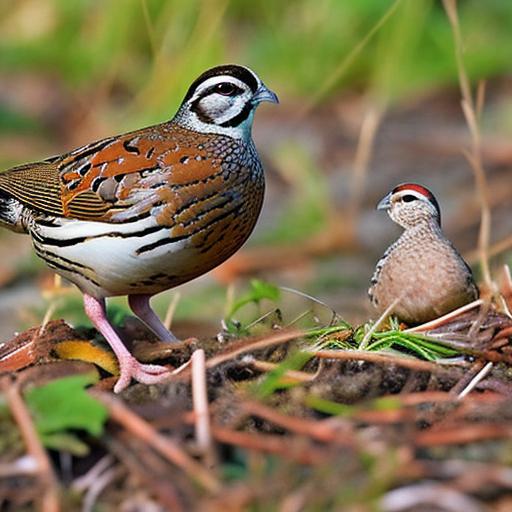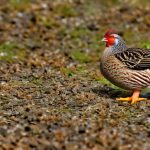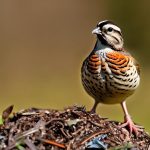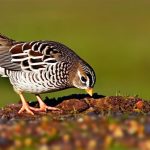Quail keeping is a rewarding and enjoyable hobby that has been gaining popularity in recent years. Quail are small, ground-dwelling birds that are known for their delicious eggs and meat. They are relatively easy to care for and can be kept in a backyard or small farm setting. Quail keeping can be a great way to connect with nature, learn about animal husbandry, and even provide a sustainable source of food for your family. In Prince William County, Virginia, quail keeping is a popular pastime for many residents who appreciate the benefits of raising these charming birds.
Quail are known for their gentle nature and low maintenance requirements, making them an ideal choice for beginners and experienced poultry keepers alike. They are also relatively quiet compared to other poultry, making them a great option for urban or suburban settings where noise may be a concern. Quail come in a variety of species, each with its own unique characteristics and requirements. Whether you are interested in raising quail for eggs, meat, or simply as pets, there is a species of quail that will suit your needs. In this article, we will explore the different aspects of quail keeping in Prince William County, including choosing the right species, creating a suitable habitat, feeding and caring for quail, breeding and raising quail, health and disease management, and legal considerations.
Key Takeaways
- Quail keeping is a rewarding hobby that requires proper knowledge and care.
- When choosing the right quail species for Prince William County, consider the climate and available space.
- Creating a suitable habitat for quail involves providing shelter, nesting areas, and access to food and water.
- Feeding and caring for quail in Prince William County requires a balanced diet and regular health checks.
- Breeding and raising quail in Prince William County can be a fulfilling experience with proper planning and care.
Choosing the Right Quail Species for Prince William County
When it comes to choosing the right quail species for Prince William County, there are several factors to consider. The most common species of quail kept in the area include the Coturnix quail (also known as Japanese quail) and the Bobwhite quail. Coturnix quail are known for their prolific egg-laying abilities, with some hens laying up to 300 eggs per year. They are also relatively small in size, making them easy to handle and care for. Bobwhite quail, on the other hand, are popular for their delicious meat and are often raised for hunting purposes.
In addition to Coturnix and Bobwhite quail, there are several other species of quail that may be suitable for keeping in Prince William County. These include the California quail, Gambel’s quail, and Mountain quail, among others. Each species has its own unique characteristics and requirements, so it’s important to research the specific needs of the species you are interested in before making a decision.
When choosing a quail species for your backyard or farm, it’s important to consider factors such as climate, space requirements, and intended purpose (e.g., eggs, meat, pets). Some species of quail may be better suited to the climate and environment of Prince William County than others, so it’s important to choose a species that will thrive in your specific location. Additionally, consider the space you have available for your quail habitat and whether you have any specific goals for raising quail (e.g., egg production, meat production, conservation). By carefully considering these factors, you can choose the right quail species for your needs and ensure a successful and enjoyable quail keeping experience in Prince William County.
Creating a Suitable Habitat for Quail
Creating a suitable habitat for quail is essential for their health and well-being. Quail are ground-dwelling birds that require a safe and secure environment with access to food, water, shelter, and space to roam. In Prince William County, there are several key considerations to keep in mind when designing a habitat for quail.
First and foremost, it’s important to provide adequate space for your quail to move around and exhibit natural behaviors. Quail are active birds that enjoy scratching and dust bathing, so providing them with a spacious outdoor area is essential. A good rule of thumb is to allow at least 1 square foot of space per quail in an outdoor enclosure. This will give them plenty of room to move around and engage in natural behaviors without feeling crowded or stressed.
In addition to space requirements, it’s important to provide suitable shelter for your quail. This can include a secure coop or sheltered area where they can roost at night and seek refuge from predators and inclement weather. The coop should be well-ventilated and provide protection from extreme temperatures, drafts, and moisture. It’s also important to provide nesting boxes or areas where your quail can lay their eggs in privacy.
Finally, providing access to food and water is essential for maintaining the health and well-being of your quail. Quail require a balanced diet that includes a high-quality commercial feed as well as access to fresh water at all times. Additionally, providing access to grit (small rocks or pebbles) is important for helping quail digest their food properly.
By carefully considering these factors and providing a suitable habitat for your quail, you can ensure that they thrive in their environment and provide you with years of enjoyment and productivity.
Feeding and Caring for Quail in Prince William County
Feeding and caring for quail in Prince William County requires attention to detail and a commitment to providing a balanced diet and proper care. Quail have specific dietary requirements that must be met in order for them to thrive and produce eggs or meat effectively.
A high-quality commercial feed formulated specifically for quail is essential for meeting their nutritional needs. Quail feed should contain a balanced mix of protein, vitamins, minerals, and other essential nutrients to support their growth, egg production (if applicable), and overall health. It’s important to choose a feed that is appropriate for the age and purpose of your quail (e.g., starter feed for chicks, layer feed for hens).
In addition to commercial feed, quail can also benefit from supplemental treats such as fresh fruits and vegetables, mealworms, and greens. These treats can provide additional nutrients and enrichment for your quail while also helping to reduce boredom and stress. It’s important to offer treats in moderation and avoid feeding foods that are toxic or harmful to quail.
In addition to providing a balanced diet, caring for quail in Prince William County also involves regular maintenance of their habitat and monitoring their health. This includes cleaning their coop or enclosure regularly to remove waste and debris, providing fresh bedding as needed, and monitoring for signs of illness or injury. It’s important to handle your quail gently and observe them regularly to ensure they are healthy and content.
By providing a balanced diet, proper care, and attention to their overall well-being, you can ensure that your quail thrive in their environment and provide you with years of enjoyment and productivity.
Breeding and Raising Quail in Prince William County
Breeding and raising quail in Prince William County can be a rewarding experience that allows you to expand your flock and potentially produce eggs or meat for your family. Quail are prolific breeders that reach sexual maturity at a young age, making them relatively easy to breed compared to other poultry species.
When breeding quail, it’s important to provide suitable nesting areas where hens can lay their eggs in privacy. This can include nesting boxes filled with soft bedding material where hens can lay their eggs undisturbed. It’s also important to provide a balanced diet that includes adequate levels of protein and other essential nutrients to support egg production.
Once eggs are laid, they can be collected daily and either incubated artificially or left with the hens to brood naturally. Incubating quail eggs requires careful attention to temperature, humidity, and turning the eggs regularly to ensure successful hatching. Once hatched, chicks should be provided with a warm brooder area equipped with heat lamps or heating pads to maintain their body temperature until they are fully feathered.
Raising quail chicks involves providing them with a balanced diet, access to fresh water at all times, and suitable shelter as they grow. Chicks should be monitored closely for signs of illness or injury and handled gently to ensure they grow into healthy adults.
By carefully managing the breeding and raising process, you can expand your flock of quail and potentially produce eggs or meat for your family while enjoying the experience of raising these charming birds in Prince William County.
Health and Disease Management for Quail
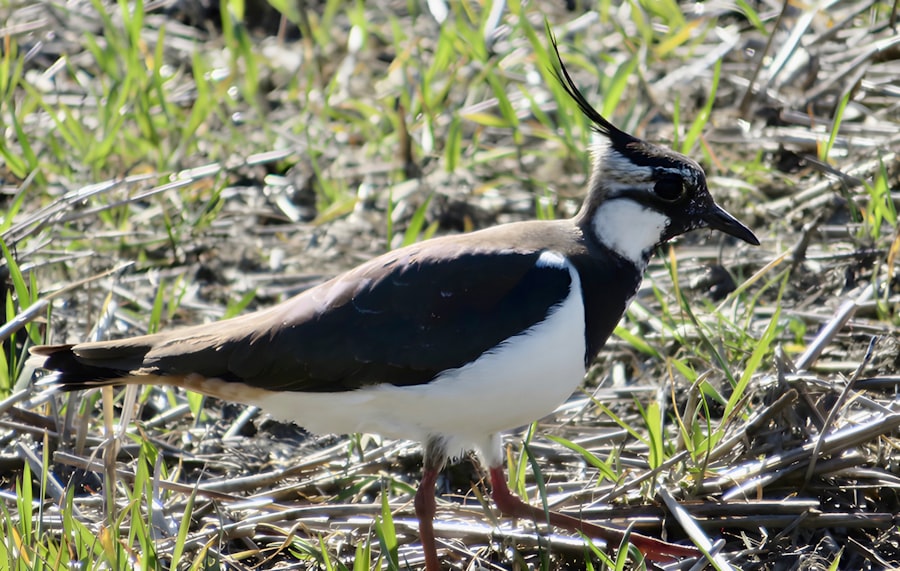
Maintaining the health of your quail is essential for their well-being and productivity. Like all animals, quail are susceptible to a variety of health issues that can impact their overall health and ability to produce eggs or meat effectively.
One of the most important aspects of health management for quail is disease prevention. This involves implementing biosecurity measures to prevent the introduction and spread of diseases within your flock. This can include quarantining new birds before introducing them to your existing flock, practicing good hygiene when handling your quail or their equipment, and monitoring for signs of illness regularly.
In addition to disease prevention, it’s important to provide a clean and sanitary environment for your quail by regularly cleaning their coop or enclosure, providing fresh bedding as needed, and ensuring access to clean water at all times. Proper nutrition is also essential for maintaining the health of your quail, so it’s important to provide a balanced diet that meets their specific nutritional needs.
Despite your best efforts at disease prevention and maintaining a clean environment, it’s still possible for quail to become ill or injured. Common health issues in quail can include respiratory infections, parasites (such as mites or worms), injuries from predators or aggressive behavior within the flock, and reproductive issues.
If you notice any signs of illness or injury in your quail, it’s important to seek veterinary care promptly to diagnose and treat the issue effectively. Early intervention can help prevent the spread of disease within your flock and improve the chances of successful treatment.
By implementing good biosecurity measures, providing proper nutrition, maintaining a clean environment, monitoring for signs of illness or injury regularly, and seeking veterinary care when needed, you can help ensure the health and well-being of your quail in Prince William County.
Legal Considerations for Keeping Quail in Prince William County
Before embarking on a journey into quail keeping in Prince William County, it’s important to be aware of any legal considerations that may apply to keeping these charming birds on your property. Local ordinances may regulate the number of birds you are allowed to keep on your property as well as any specific requirements for housing or care standards.
In Prince William County, zoning regulations may dictate whether you are allowed to keep poultry on your property at all or if there are specific restrictions on the type or number of birds you can keep. It’s important to research local ordinances before starting your quail keeping venture to ensure that you are in compliance with any applicable regulations.
In addition to zoning regulations, there may be specific requirements related to housing standards or care practices that you must adhere to when keeping quail in Prince William County. This can include standards for coop size, ventilation, waste management practices, predator control measures, and more.
It’s also important to consider any potential neighbor concerns related to noise or odor from keeping quail on your property. Being a good neighbor by maintaining clean facilities, minimizing noise disturbances from your birds, and addressing any concerns promptly can help ensure a positive experience for both you and your neighbors.
By researching local ordinances, adhering to housing standards and care practices, being mindful of potential neighbor concerns, and seeking any necessary permits or approvals before starting your quail keeping venture in Prince William County, you can enjoy the experience of raising these charming birds while remaining in compliance with local regulations.
In conclusion, keeping quails in Prince William County can be an enjoyable experience that provides opportunities for sustainable food production as well as connecting with nature. By carefully considering factors such as choosing the right species of quails suited for the area’s climate conditions; creating suitable habitats; feeding; breeding; health management; legal considerations; one can ensure successful outcomes while enjoying this rewarding hobby.
If you’re interested in learning more about keeping quail in Prince William County, you might also find our article on creating the perfect chicken coop to be helpful. Whether you’re raising quail, chickens, or other poultry, a well-designed coop is essential for their health and safety. Check out our article on creating the ideal chicken coop for tips and advice on providing a comfortable and secure environment for your birds.
FAQs
What are the regulations for keeping quail in Prince William County?
In Prince William County, regulations for keeping quail may vary. It is important to check with the local government or animal control department to understand the specific rules and regulations for keeping quail in the area.
What are the housing requirements for keeping quail in Prince William County?
The housing requirements for keeping quail in Prince William County may include providing a secure and predator-proof enclosure with adequate space for the quail to move around. It is important to provide proper ventilation, protection from the elements, and a clean environment for the quail.
What do quail eat and how should they be cared for in Prince William County?
Quail typically eat a diet of seeds, grains, and insects. In Prince William County, it is important to provide a balanced diet for the quail and ensure they have access to clean water at all times. Additionally, regular health checks and proper care should be provided to ensure the well-being of the quail.
Are there any restrictions on keeping quail in residential areas of Prince William County?
In some residential areas of Prince William County, there may be restrictions on keeping quail. It is important to check with the local zoning regulations and homeowners’ association rules to understand any restrictions or requirements for keeping quail in residential areas.
What are the benefits of keeping quail in Prince William County?
Keeping quail in Prince William County can provide benefits such as a sustainable source of eggs and meat, pest control in gardens, and the enjoyment of observing and caring for these unique birds. Additionally, quail keeping can be a rewarding hobby for individuals interested in raising poultry.
Meet Walter, the feathered-friend fanatic of Florida! Nestled in the sunshine state, Walter struts through life with his feathered companions, clucking his way to happiness. With a coop that’s fancier than a five-star hotel, he’s the Don Juan of the chicken world. When he’s not teaching his hens to do the cha-cha, you’ll find him in a heated debate with his prized rooster, Sir Clucks-a-Lot. Walter’s poultry passion is no yolk; he’s the sunny-side-up guy you never knew you needed in your flock of friends!

